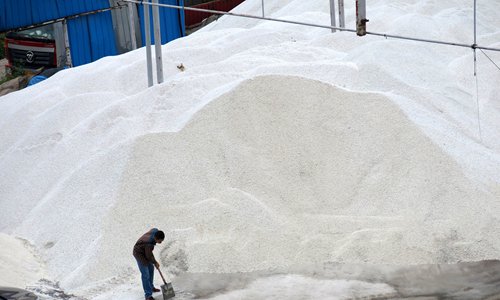HOME >> SOURCE
US Army’s establishment of rare-earth fund is too little, too late
By Chi Jingyi Source:Global Times Published: 2019/12/12 22:48:40

A worker unloads rare earths along the Yangtze River's banks in Southwest China's Chongqing Municipality on May 9. Photo: IC
The US Army plans to fund the construction of rare-earth facilities to secure crucial supplies for its military weapons and electronic systems. Analysts say the US remains highly reliant on Chinese exports and is incapable of producing sufficient rare-earth minerals as it needs, within a short timeframe.
The investment marks the first time in 77 years that the US military has financially committed to the commercial-scale production of rare earths, according to a secret government document obtained by Reuters on Wednesday.
"The US relies heavily on Chinese imports of rare earths. This can be seen in the US' removal of rare-earth products from its list of imports subject to China-US trade war tariffs," Yang Kunhe, chief metals and mining analyst at Pacific Securities, told the Global Times on Thursday.
Rare-earth imports from China accounted for 80 percent of total US imports from 2014-17, and China has controlled approximately 90 percent of the world's rare-earth production during the past two decades, according to the United States Geological Survey.
The US Government Accountability Office estimates it would take 15 years to overhaul the defense supply chain, meaning that any changes will need considerable time.
"The US will not be able to produce enough rare earths to fill the gap left behind by Chinese imports in the short term," said Yang.
The US has been exploring new sources of rare-earth minerals used in high-tech manufacturing to end the Chinese monopoly on the sector. But currently, switching from present suppliers including China would cause major disruptions to supply chains, wrote Russell Parman, a foreign intelligence officer at the US Army Aviation and Missile Command, on the US Army's website in September.
"The US Army has started funding the industry as huge capital is needed to build an industrial chain. For example, rare-earth separation plants - a small part of the industrial chain - cost at least $700 million to $1 billion alone," Yang noted.
"US tech firms are reliant on rare earths, which are used to make batteries, computer screens, jet engines and other necessary equipment. If they lose their Chinese supplies, costs will rise sharply and that will hurt. They have likely felt the pain as Chinese exports have decreased," Zhou Xuezhi, a research fellow at the Institute of World Economics and Politics under the Chinese Academy of Social Sciences, told the Global Times.
China's exports of rare earths hit 2,635.8 tons in November, down 42.8 percent year-on-year. The average export price was $12.6 per kilogram, up 29.3 percent year-on-year, data from the General Administration of Customs showed.
Zhou added that the rare earths card is an important bargaining chip for China in the trade talks with the US.
Posted in: INDUSTRIES,ECONOMY